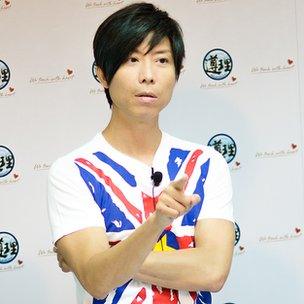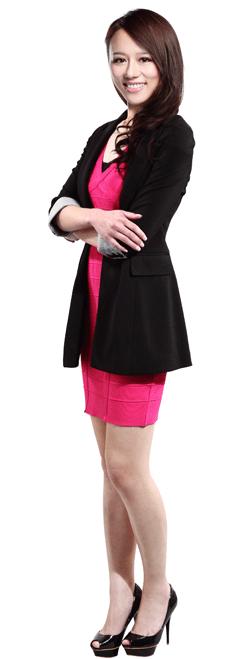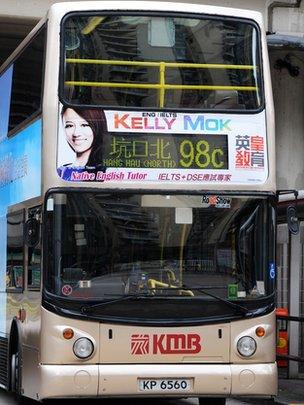Meet the 'tutor kings and queens'
- Published
They strike glamorous poses in posters in shopping malls and on the sides of buses.
But they are not movie stars or supermodels: they are Hong Kong's A-list "tutor kings" and "tutor queens", offering pupils a chance to improve mediocre grades.
In Hong Kong's consumer culture, looks sell. Celebrity tutors in their sophisticated hair-dos and designer trappings are treated like idols by their young fans who flock to their classes.
And they have earnings to match - some have become millionaires and appear regularly on television shows.
"If you want to be a top tutor, it definitely helps if you are young and attractive. Students look at your appearance," said Kelly Mok, 26, a "tutor queen" at King's Glory, one of Hong Kong's largest tutorial establishments.
Her designer clothes and accessories are not just for the billboards; it's how she likes to dress outside classes. But she is also careful to add that she wouldn't be in such high demand if she could not deliver top grades in her subject, English.
Rock-star image
Richard Eng from Beacon College is often credited with being the first of Hong Kong's "star tutors". A former secondary school teacher, he says he got the idea after he featured in photographs advertising his sister, a performance artist.
"In school all the teachers look the same, there's no excitement," he said.

Richard Eng has brought a show business approach to the world of improving exam grades
His own image appears on special ring-binders and folders containing study tips, or pens which harbour a pull-out scroll with his picture and other gifts. Such items became so sought after that they propelled him to near-rock star status among young people.
The celebrity tutor phenomenon is a result of the huge growth in out-of-school tutoring in Asia.
It is fuelled by highly pressured examination systems and ambitious parents wanting their children to secure places at top universities and high-status secondary schools.
In societies where success is equated with good exam results, parental anxiety converts into a "steady stream of revenue" for tutoring establishments, according to a study by the Asian Development Bank (ADB).
The tutoring industry, or "shadow education" as the ADB calls it, has become very widespread in Asia, fed by the growth in universities and the rising proportion of school leavers aiming for university.
Hong Kong University's professor Mark Bray, one of the authors of the ADB study, said a staggering 72% of final-year school students in Hong Kong now go to private tutors.
Richer families have always paid for individual tutoring, but the star tutors offer exam tips and revision notes to the less well-off, studying in groups of over 100.
'Getting an edge'
It's not just Hong Kong. Tutoring has "spread and intensified in Asia and become more commercialised," said professor Bray. In South Korea, 90% of primary school children attend such classes.

Forget the elbow patches, tutor Kelly Mok teaches English with style
In South Korea, Thailand, Sri Lanka and India, tutorial schools use star tutors to attract even more students. "They have found a way to appeal to young people and pull them in. They create a buzz," he said.
"We had this phenomenon of star tutors in Kota as well," said Pramod Maheshwari, chief executive of Career Point Coaching School in Kota, Rajasthan, India, a city of residential tutorial colleges which attract students from all over the country.
"It can give you an edge." But ultimately, he says, expansion of tutoring is driven not by personalities but by "the inefficiency of the school system".
"Across India, students' education level is not up to the mark, and millions are preparing for competitive college examinations. It is a huge market," said Mr Maheshwari.
In China, where private tutorial schools were unknown until the economy opened up in the 1990s, New Oriental Education and Technology has grown to become one of the largest tutoring schools in Asia with around 2.4 million students this year.
It boasts 17,600 teachers in 49 cities and an online network of over 7.8 million users.
Listed on the New York stock exchange since 2006, its founder Michael Yu (also known as Yu Minhong), became a multi-millionaire on the back of his blend of rote learning exercises, stand-up comedy and motivational speeches.
A man from a humble background, who had become an English teacher at Peking University, Mr Yu used the Hong Kong model of employing star tutors to prepare students for tests for universities abroad.
Extensive tutoring is sometimes seen as contributing to East Asian countries' high performance in international school comparisons, particularly in mathematics.
But professor Bray points out that the high performers in the international Pisa tests (Programme for International Student Assessment) also include countries that do not use much tutoring, such as in Scandinavia.
Tutor ban
There have also been attempts to reduce the impact of tuition.
In the 1980s, the South Korean government issued a blanket prohibition on such private tutoring.
It proved to be unenforceable, but it reflected worries that tuition can put too much pressure on pupils, with teachers complaining that pupils were falling asleep in class after long nights of tutoring.
In 2009, the South Korean government adopted measures to limit the number of hours students spent in "hagwons" or tutorial centres in a bid to reduce childhood stress and increase the level of creative thinking.
But the impact has been limited, pushing many tutorial classes online.
The government has since realised that the only way to change is to alter the exam culture, reducing the number of university entrance exams and encouraging universities to consider applicants on more than just exam scores.
A Singaporean study showed that while tutoring can have a positive influence on the subject being tutored, time taken away from other subjects may lead to a decline in overall academic performance.
The ADB report says in all parts of Asia, families are spending a considerable amount of the household income on tutoring. It may contribute to improved achievement for individual students, but it can exacerbate social inequalities.
Exam panic
Although there is some evidence of a cultural propensity to pay for tutoring - cities such as Vancouver in Canada and Sydney in Australia with large Chinese communities have a lot of tutoring - this is not the only factor.
"What happens in tutoring depends on what the schools and universities ask for. The parents will respond to whatever they think will get them in," said professor Bray.

Kelly Mok looks down from a Hong Kong bus
Hong Kong recently shifted from a system similar to GCSEs and A-levels used in the UK to a single examination taken at age 17, leading to an explosion in tutoring. "There is greater pressure on students because there is only one examination that determines whether you get into university," said Kelly Mok.
"With so many tutors in Hong Kong, students don't know who to choose so they go for the 'tutor kings' and 'tutor queens'," she said.
Some students just attend the lectures and watch video recordings of lectures while others purchase add-ons such as personalised interaction with the star tutor or tutor's aide via Facebook or email.
But as more students enrol, it can become increasingly difficult to keep up with examination tips learned by classmates. "Students who would not otherwise have had tutoring may now do so in order not to be at a competitive disadvantage," says professor Bray.
But Richard Eng denies that tutors are sowing panic. "Panic comes from the exams themselves. If there was no examination in Hong Kong, no matter what I say or look like, they would not come to me."